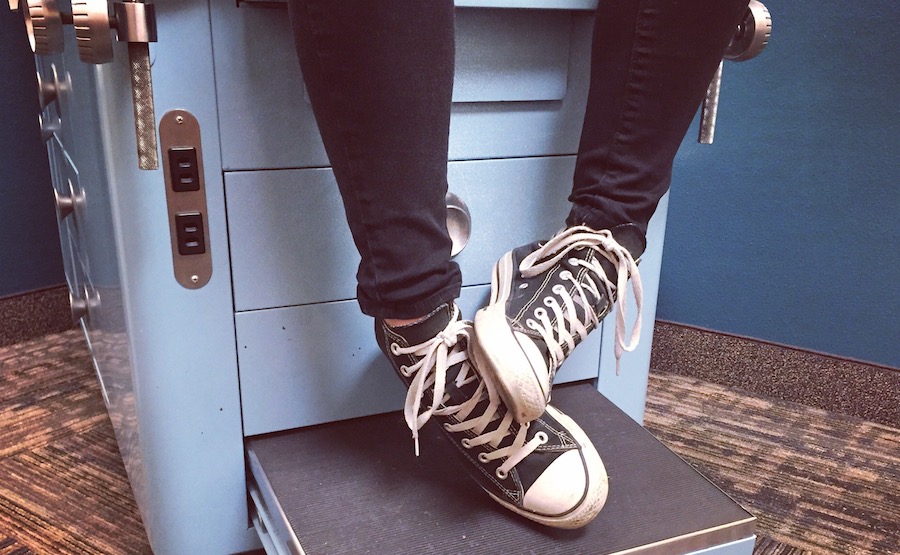Introverts: How to Get the Care You Deserve When You Visit the Doctor

Is there anything worse in life than going to the doctor? There is — calling to make an appointment to see the doctor. But I digress. Visits to the doctor’s office are a special kind of hell for introverts. The rapid-fire questions, poking and prodding, and general invasiveness of the whole affair are all kinds of uncomfortable. They’re the kinds of things that, by definition, are hard for introverts. Unfortunately, it’s an incredibly necessary part of life, and as such, we have to learn how best to deal with it.
Introverts Often Receive Substandard Healthcare
A study carried out by the Netherlands Organization for Scientific Research revealed that introverts often receive substandard healthcare because they’re reluctant to speak up about physical problems. In fact, the study found that introverted heart failure patients were six times more likely than their extroverted counterparts to be in poor health.
With doctor’s visits being so hurried these days, patients have to be assertive if they want the best standard of care. But since introverts often have trouble knowing what to say (thanks to issues with word retrieval), it can be extremely hard to speak up under that kind of pressure.
However, protecting your health is vital — no matter how much you might feel like waiting it out, it’s imperative to seek out a physician when you’re ill. While I know the the whole idea may sound unpleasant, there are a few things you can do to make things as painless as possible.
Introverts: Tips for Handling Medical Visits
Though under normal circumstances you may be inclined to listen more than you speak, it won’t serve you well when consulting with a doctor. If you fail to adequately describe your symptoms and concerns, your physician can’t properly diagnose the issue. The easiest way to tell if this is an ongoing problem is to ask yourself the following question: “When I leave doctors’ appointments, have all my questions been answered and my concerns been addressed?” If your answer is no, there’s a good chance you’re not being your own best advocate.
Of course, being your own best advocate is easier said than done — believe me, I’ve been there multiple times. However, it can be done. Here’s how you can take charge of your next appointment:
- Determine what you need to discuss with your doctor before you attend your appointment. Write down a list of your concerns and questions, and make them specific. Not only will this make you less likely to panic and forget what you wanted to ask, it will also help your doctor ensure your needs are being met. This is especially important if you have a chronic condition, as you can keep track of your symptoms and any changes you may have experienced.
- Remember that your needs are valid, too. In a society that values the extrovert’s way, introverts have gotten used to hiding their needs or pretending that they don’t have them. But it’s absolutely imperative to not do this when it comes to your physical health. If something hurts, say it. If you didn’t understand something clearly, ask again. Your health is more important than the minor inconvenience you might cause for your medical provider.
- Bring a friend or family member to serve as your advocate/support system. They can take detailed notes, remind you about things you wanted to talk over, and remind you of doctors’ instructions after the visit has concluded.
- Ask your doctor if they are are willing to answer questions about what was discussed or your treatment instructions via email. This can save you both time and money.
If you find yourself forgetting what you wanted to say or becoming easily overwhelmed when talking to your physician, it’s not a bad idea to discuss your introversion and how they can help make sure you’re receiving the best care — whether it be slowing down when talking to you or giving you plenty of time to think over and answer each question. A truly professional medical provider will do what they can to make you comfortable.
The Future Is Introvert Friendly
The future of healthcare might be decidedly more introvert friendly. Currently in its infancy, telehealth (also known as telemedicine) is poised to influence medicine in new and exciting ways. The telehealth movement is not only being driven by technological advances, but by the sheer number of aging boomers — which has experts hypothesizing that we’re trending toward a shift from hospital-based care to home-based care. Areas where telehealth can make a real difference include:
- Operating as a low-cost alternative to regular office visits
- Remotely monitoring recently discharged patients
- Treating individuals with mental health issues who might ordinarily avoid treatment due to stigma
- Ensure patients who cannot leave their home still have access to quality medical care
Telehealth also offers mobile apps that can help patients with chronic conditions maintain their treatment plans while staying connected with their doctors. Unfortunately, there are a number of obstacles (laws, insurance, security issues, and so on) that medical administrators are going to have to overcome before telehealth can take its place in society. Until then, we’ll have to make due with schlepping ourselves down to the doctor’s office every time we have a stubborn cough or need our yearly physical.
Though there’s nothing remotely fun about going to the doctor, it doesn’t have to be an anxiety-inducing event. As long as you take time to properly prepare your questions and concerns, you can make the most of an unpleasant situation. ![]()
Did you enjoy this article? Sign up for our newsletters to get more stories like this.
Read this: Why Introverts Absolutely Loathe Talking on the Phone
Image credit: @jasmom1 via Twenty20
